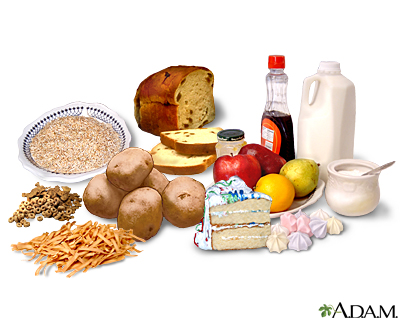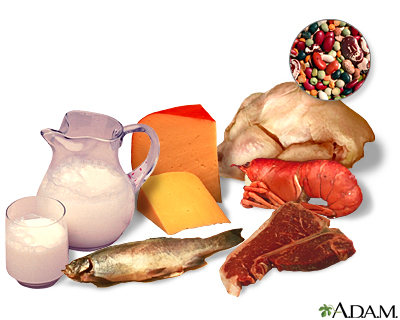| Step 6: Lose weight and follow the right diet |
Good nutrition can improve everyone's health, but when you have type 2 diabetes, eating the right foods is essential. You may worry about what kinds of food to choose. But once you understand a few basic facts, you will become more confident in your ability to eat well. Give yourself time to work on your diet because eating habits DO NOT change overnight.
Here are the basic facts to understand:
- Carbohydrate-containing foods affect your sugar levels more than any other type of food.
- Carbohydrates are found in starchy or sugary foods, such as bread, rice, pasta, cereal, potatoes, peas, corn, fruit, fruit juice, milk, yogurt, cookies, candy, soda, and other sweets.
- High-fiber, whole-grain carbohydrates are digested more slowly and are healthier choices.
- While vegetables, such as carrots, broccoli, and spinach, contain some carbohydrates, they are healthier options. Enjoy lots of them!
- Carbohydrates in food are measured in grams. You can learn to count the carbohydrates in the foods that you like and that you eat.

Other important factors that impact your health and blood sugars are:
- Controlling your weight
- Eating healthy protein foods
- Including vegetables and fruit every day
- Enjoying the "good" fats
- Choosing carbohydrates wisely
- Determining a meal plan
Let's take these one at a time.
Losing weight and keeping it off
For many people with diabetes, weight loss is the key to getting control of blood sugar and may eliminate the need for medication. A weight change of just 5 - 10 % can be enough to control type 2 diabetes. (If you weigh 200 pounds, that's a loss of only 10 - 20 pounds!) You can enjoy looking better, feeling better, and having more energy -- all while reducing your risks for serious complications from diabetes.
Losing weight will help your cells better process the insulin in your blood (what we call lowering insulin resistance). To lose weight you need to take in fewer calories and burn more. When you eat, your body converts calories into energy. Eating more than your body needs leads to storing the extra energy as body fat. Eating less will decrease your fat stores.
To estimate how many calories you need in order to lose weight follow, these steps:
- Write what you think is a healthy weight for you on this line:________
- Add a zero to the end of that number.
- If you reduce your usual daily calories to this number, you should begin to lose weight. (For example, if your desired weight is 130 pounds, your total calorie intake each day should be no more than 1300.)
NOTE: It is important to talk with your health care provider before following a low-calorie diet.
You can find calorie and nutrition information on food labels or in books or on websites designed for this purpose. You may be surprised at how fast calories add up. You may need to do some measuring of portions to be accurate with your counting. Pay attention to how much cereal, rice, or pasta you are putting on your plate. Is it more than you would have guessed, or more than you should eat?
Eating healthy protein foods
Protein is an important nutrient that builds muscles and bones and gives you energy. Protein also helps with weight control because it helps you feel full and satisfied from your meals.
The healthiest proteins are the leanest. This means that they have the least fat and calories. The best animal protein choices are fish or shellfish, skinless chicken or turkey, low-fat or fat-free dairy (skim milk, low-fat cheese), and egg whites or egg substitute. Plant proteins, such as those from beans, nuts, legumes (lentils or soy foods such as tofu or soymilk) can be as healthy or healthier. If you eat red meats, choose the leanest cuts (loin and tenderloin).

High-fat proteins like many red meats, fried fish, and cheeses contain more calories and unhealthy fat. Try to eat these much less often.
If you already show signs of kidney damage, your health care provider will likely have you restrict protein intake and should teach you how to do so.
Including vegetables and fruit every day
Vegetables like broccoli, green beans, leafy greens, zucchini, cauliflower, cabbage, carrots, and tomatoes are low in calories and high in fiber, vitamins, and minerals. Many studies have shown that eating plenty of vegetables is extremely healthy. Try to eat at least 3 - 5 servings every day. This amounts to roughly 2 cups of vegetables.
Fruit is also a good source of fiber, vitamins, and minerals. You should try to eat about 2 - 3 servings of fruit each day. Fruit servings can be tricky. One fruit serving is equal to: 1 medium apple, pear or orange; 1 small banana; or 4 ounces of juice. Whole fruits are the best choices because they contain fiber.

Enjoying the good fats
Fat is an essential part of your diet. If you have heard that you should eliminate all fat from your diet, you will be pleased to learn that eating healthy fat can improve your diabetes control and even help you lose weight. The best way to keep calories under control while adding the good fats is to remove some of the "empty calorie" foods like chips and crackers or other high-carb processed foods. If you replace some of your simple carbohydrates with these fats, you may get better blood sugar results. For example, try eating 10 almonds or walnuts rather than crackers. Or, eliminate croutons and try a few slices of avocado on your salad instead.
The best choices for fat in your diet are called mono-unsaturated fats and omega-3 fatty acid.
Examples of good fats include olive and canola oils, oily fish, walnuts, almonds, peanut butter, avocado, and olives. An extra benefit is that these foods taste good.

The fats that you should eat less often are saturated fats (which come from butter and other full-fat dairy products and meat) and partially hydrogenated fats, or transfats, (found in many margarine, crackers, chips, cookies, and other convenience foods).
Choosing carbohydrates wisely
All carbohydrates are not equal. The best are high in fiber and provide slow-releasing energy into your blood. Beans, whole grain bread, oatmeal, fresh fruit, whole-wheat couscous or pasta, brown rice, and barley are among the best carbohydrate choices for your diet. These carbohydrates have a lower glycemic index.
Look for the word "whole" (like "whole wheat") as the first ingredient on food labels of breads and cereals.
The Glycemic Index can help you choose carbohydrates wisely. It is a measure of how fast a food raises blood sugar. More research is needed to evaluate if the glycemic index is a useful tool in controlling your diabetes.
Find a meal plan that works for you
A meal plan means that you follow a pattern of eating from day to day. Finding a routine and being consistent with your food will help you get better control of your blood sugar levels. A registered dietitian who understands diabetes can help you set up an eating plan.
Remember to take your time in trying to change your eating patterns. Food plays so many roles in our lives and we've formed our eating habits over many years. It may be easier to work on one change at a time. Gradual progress is often the key to success.
|
Review Date:
7/8/2012 Reviewed By: Nancy J. Rennert, MD, Chief of Endocrinology & Diabetes, Norwalk Hospital, Associate Clinical Professor of Medicine, Yale University School of Medicine, New Haven, CT. Review provided by VeriMed Healthcare Network. Previoulsy reviewed by Ari S. Eckman, MD, Division of Endocrinology and Metabolism, Johns Hopkins School of Medicine, Baltimore, MD. Review provided by VeriMed Healthcare Network. (5/13/2010) |
© 1997- A.D.A.M., a business unit of Ebix, Inc. Any duplication or distribution of the information contained herein is strictly prohibited.
